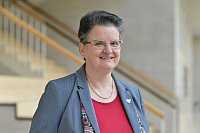Excellence Strategy
The Excellence Strategy of the German federal & state governments (ExStra) aims to strengthen Germany as an outstanding science location and further improve its international competitiveness. The program comprises the funding lines: Clusters of Excellence and Universities of Excellence.
The Excellence Strategy is implemented jointly by the German Research Foundation and the German Council of Science and Humanities.

In the funding period 2026-2032 MLU has received funding for the Cluster of Excellence "Center for Chiral Electronics". In addition, scientists from MLU also participate in two other Clusters of Excellence.
MLU considers its participation in the Excellence Strategy to be important for the development of the university.

Excellent News
University of Halle receives funding for a Cluster of Excellence
May 22, 2025 | Read more
Quantum Materials for Future Technologies | Appointment of Niels Schröter
May 16, 2025 | Read more
Georg Woltersdorf appointed as Max-Planck-Fellow
February 07, 2025 | Read more

A great success for MLU and Halle as science location
The Martin Luther University Halle-Wittenberg (MLU) is one of the winners of the Excellence Strategy.
MLU Halle has achieved a great success in the highly competitive Excellence Strategy. Together with its partners at the FU Berlin, University of Regensburg and Max Planck Institute of Microstructure Physics Halle, the university has acquired the Cluster of Excellence “Center for Chiral Electronics”. In addition, scientists of MLU are involved in other Clusters of Excellence.
Rector Prof. Claudia Becker on the success of MLU

Rector Prof. Claudia Becker, Foto: Markus Scholz
"The selection of the Center for Chiral Electronics is an outstanding achievement for Martin Luther University as well as for the state of Saxony-Anhalt. This initiative will foster cutting edge research in materials science. We have been increasing our focus on this core research area in recent years, an investment that is now rewarded by our success in the Excellence Strategy. Furthermore, the university as a whole will also benefit from the funding and be able to boost its reputation as an internationally recognised research institution. We thank all those involved who have made this success possible."

Center for Chiral Electronics
MLU Halle | FU Berlin | U Regensburg | MPI of Microstructure Physics

Center for Chiral Electronics
Inspired by nature, the Center for Chiral Electronics (CCE) aims to develop new chiral materials and concepts for ultrafast and efficient electronics. Chirality is a key property and ubiquitous in nature. It means that an object cannot be superimposed on its mirror image through rotation and translation – as with human hands: left and right hands are similar, but not identical. This property gives many objects an intrinsic stability. Surprisingly, until now, chirality is not used at all in electronics. This is where the research of CCE comes in. CCE aims to gain a new physical understanding of this effect and to lay the foundations for the next generation of electronics and memory technology.
Spokespersons: Prof. Georg Woltersdorf (MLU Halle) together with Prof. Katharina Franke (FU Berlin) and Prof. Christoph Strunk (U Regensburg)

Cluster of Excellence on Plant Sciences (CEPLAS)
Heinrich-Heine-Universität Düsseldorf | Unversität zu Köln | Leibniz-Institut für Pflanzengenetik und Kulturpflanzenforschung | Forschungszentrum Jülich | MPI für Pflanzenzüchtungsforschung Köln
Leibniz Institute of Plant Genetics and Crop Plant Research (IPK), represented by director and MLU professor Nicolaus von Wirén, will make an important contribution to the cutting-edge research of the Cluster of Excellence on Plant Sciences (CEPLAS) with its important gene bank for crop plants, state-of-the-art phenotyping platforms and expertise in crop genetics and genomics.
Spokesperson: Prof. Maria von Korff Schmising (HHU Düsseldorf)
Deputy speaker: Prof. Bart Thomma (U Köln)

Imaginamics: Practices and Dynamics of Social Imagining
Friedrich-Schiller-Universität Jena
MLU Professor Daniel Fulda is principle investigator at Imaginamics. The Cluster of Excellence is based on a strong regional network and combines scientific expertise with social dialog. Together, the processes and practices of social imagining are researched in order to gain a deeper understanding of how shared ideas arise, have an effect and shape social cohesion as well as conflicts.
Spokesperson: Prof. Johannes Grave
Co-Spokesperson: Prof. Christina Brandt
Co-Spokesperson: Prof. Joachim von Puttkamer




